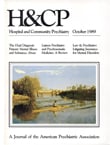Psychosomatic Medicine and Consultation-Liaison Psychiatry: Past, Present, and Future
Abstract
Although "psychosomatic meducine" and "consultation-liaison psychiatry" are imprecise terms, they continue to be useful in describing, respectively, theoretical constructs of the relationship between psychiatry and the rest of medicine and the day-to-day applications of these constructs. The history of these fields encompasses many contributions of psychoanalysis, including the formulation of specificity theory and the so mo topsychic-psychosomatic process, as well as the work of Henry, Gregg, and Engel. Currently, their scope incorporates a large and expanding group of physical illnesses and clinical settings. Like the rest of medicine, these fields will continue to feel the effects of reduced federal support, a consumer-oriented society, and increased regulation. However, with advances in psychosomatic theory and broader clinical and research activity, induding that stemming from biological psychiatry, the future of psychosomatic medicine and consultation-liaison psychiatry seems positive.
Access content
To read the fulltext, please use one of the options below to sign in or purchase access.- Personal login
- Institutional Login
- Sign in via OpenAthens
- Register for access
-
Please login/register if you wish to pair your device and check access availability.
Not a subscriber?
PsychiatryOnline subscription options offer access to the DSM-5 library, books, journals, CME, and patient resources. This all-in-one virtual library provides psychiatrists and mental health professionals with key resources for diagnosis, treatment, research, and professional development.
Need more help? PsychiatryOnline Customer Service may be reached by emailing [email protected] or by calling 800-368-5777 (in the U.S.) or 703-907-7322 (outside the U.S.).



